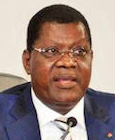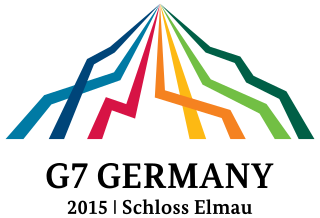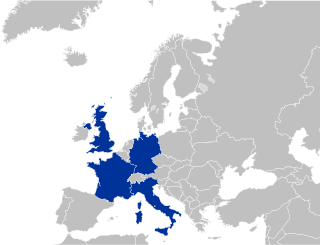
In the 19th century France built a new French colonial empire second only to the British Empire. It was humiliated in the Franco-Prussian War of 1870–71, which marked the rise of Germany to dominance in Europe. France allied with Great Britain and Russia and was on the winning side of the First World War. If it was initially easily defeated early in the Second World War, Free France, through its Free French Forces and the Resistance, continued to fight against the Axis powers as an Allied nation and was ultimately considered one of the victors of the war, as the allocation of a French occupation zone in Germany and West Berlin testifies, as well as the status of permanent member of the United Nations Security Council. It fought losing colonial wars in Indochina and Algeria. The Fourth Republic collapsed and the Fifth Republic began in 1958 to the present. Under Charles De Gaulle it tried to block American and British influence on the European community. Since 1945, France has been a founding member of the United Nations, of NATO, and of the European Coal and Steel Community. As a charter member of the United Nations, France holds one of the permanent seats in the Security Council and is a member of most of its specialized and related agencies.

A great power is a sovereign state that is recognized as having the ability and expertise to exert its influence on a global scale. Great powers characteristically possess military and economic strength, as well as diplomatic and soft power influence, which may cause middle or small powers to consider the great powers' opinions before taking actions of their own. International relations theorists have posited that great power status can be characterized into power capabilities, spatial aspects, and status dimensions.

Youssouf Ouédraogo was a Burkinabé politician. In 1992 he became the first Prime Minister of Burkina Faso since 1983, serving from 16 June 1992 to 22 March 1994. Ouédraogo, a member of the ruling Congress for Democracy and Progress (CDP), later served as Minister of State for Foreign Affairs from January 1999 to June 2007.

The Group of Seven (G7) is an inter-governmental political forum consisting of Canada, France, Germany, Italy, Japan, the United Kingdom, and the United States. In addition, the European Union is a 'non-enumerated member'. Its members are the world's largest IMF advanced economies and wealthiest liberal democracies; the group is officially organized around shared values of pluralism and representative government. As of 2020, the collective group accounts for a little over 50 percent of global net wealth, 32 to 46 percent of global gross domestic product, and about 770 million people or 10 percent of the world's population. Most members are great powers in global affairs and maintain mutually close political, economic, social, legal, environmental, military, religious, cultural, and diplomatic relations. Since the start of 2022, Germany has taken over the rotating presidency of the G7.
A sherpa is the personal representative of a head of state or head of government who prepares an international summit, such as the annual G7 and G20 summits. Between the G7 summits there are multiple sherpa conferences where possible agreements are laid out. This reduces the amount of time and resources required at the negotiations of the heads of state at the final summit. The name sherpa—without further context—refers to sherpas for the G7 summit, but the designation can be extended to different regular conferences where the participation of the head of state is required. The sherpa is generally quite influential, although they do not have the authority to make a final decision about any given agreement.

The Union for the Mediterranean is an intergovernmental organization of 42 member states from Europe and the Mediterranean Basin: the 27 EU member states and 15 Mediterranean partner countries from North Africa, Western Asia and Southern Europe. It was founded on 13 July 2008 at the Paris Summit for the Mediterranean, with an aim of reinforcing the Euro-Mediterranean Partnership (Euromed) that was set up in 1995 as the Barcelona Process. Its general secretariat is located in Barcelona, Spain.

Matteo Renzi, is an Italian politician who served as Prime Minister of Italy from 2014 to 2016. He has been a senator for Florence since 2018. Renzi has served as the leader of the Italia Viva (IV) since 2019, having been the secretary of the Democratic Party (PD) from 2013 to 2018, with a brief interruption in 2017.

The 2015 G20 Antalya summit was the tenth annual meeting of the G20 heads of government/heads of state. It was held in Belek, Antalya Province, Turkey on 15–16 November 2015. The venue for the Leaders Summit was Regnum Carya Hotel Convention Centre at the Regnum Carya Golf & Resort Spa.
The EU three, also known as EU big three, EU triumvirate, EU trio or simply E3, refers to France, Germany and Italy, a group that consists of the three large founding members of the European Union.

The 2013 G20 Saint Petersburg summit was the eighth meeting of the G20 heads of government/heads of state. The hosting venue was the Constantine Palace in Saint Petersburg, Russia, on 5–6 September 2013.
The 40th G7 summit was held 4–5 June, 2014 in Brussels, Belgium. It was originally scheduled to be held as the “40th G8 summit” and be hosted by Russia in the Black Sea resort of Sochi. However, the other seven countries decided on 24 March that the summit would be instead held without Russia in Brussels.

The 41st G7 summit was held in Schloss Elmau, Krün, Bavaria and Germany on 7–8 June 2015. In March 2014 the remaining members of the G8 declared that a meaningful discussion was currently not possible with Russia, and since then meetings have continued under the G7 name.

The Big Four, also known as G4, refers to France, Germany, Italy and the United Kingdom. France and the United Kingdom are official nuclear-weapon states and are permanent members of the United Nations Security Council with the power of veto, which enables any one of them to prevent the adoption of any "substantive" draft Council resolution, regardless of its level of international support. The United Kingdom is the only country of the Big Four which is not a member state of the European Union having ended its membership in 2020 after a referendum was held in 2016 which resulted in a small majority vote in favour of leaving the bloc. France, Germany, Italy and the United Kingdom are considered major European economic powers and they are the Western European countries individually represented as full members of the G7 and the G20. They have been referred to as the "Big Four of Europe" since the interwar period. The term G4 was used for the first time when French President Nicolas Sarkozy called for a meeting in Paris with Italian Prime Minister Silvio Berlusconi, Prime Minister of the United Kingdom Gordon Brown and Chancellor of Germany Angela Merkel to consider the response to the financial crisis during the Great Recession. The Organisation for Economic Co-operation and Development describes them as the "Four Big European Countries".

The 2014 Wales Summit of the North Atlantic Treaty Organization (NATO) was a meeting of the heads of state and heads of government of the NATO countries, held in Newport, Wales on 4 and 5 September 2014. Such summits are sporadically held, and allow leaders and officials from NATO Allies to discuss current issues of mutual concern and to plan strategic activities. The 2014 summit has been described by US Navy Admiral James G. Stavridis as the most important since the fall of the Berlin Wall.

The 42nd G7 summit was held on 26–27 May 2016 at the Shima Kanko Hotel in Kashiko Island, Shima, Mie Prefecture, Japan. In March 2014, the G7 declared that a meaningful discussion was currently not possible with Russia in the context of the G8. Since then, meetings have continued within the G7 process.
The foreign policy of the Angela Merkel government has been the foreign policy of Germany since Merkel took office as Chancellor of Germany in November 2005. During Merkel's chancellorship, Merkel has personally been highly active in the field of the foreign policy. She named Frank-Walter Steinmeier to serve as Minister for Foreign Affairs from 2005 to 2009; the office was subsequently held by Guido Westerwelle from 2009 to 2013, and again by Steinmeier from 2013. He was succeeded by Sigmar Gabriel in 2017, who was himself succeeded by Heiko Maas in 2018.

The 45th G7 summit was held on 24–26 August 2019, in Biarritz, France. In March 2014, the G7 declared that a meaningful discussion was currently not possible with Russia in the context of the G8. Since then, meetings have continued within the G7 process. However, according to a senior Trump administration official, Donald Trump and Emmanuel Macron had agreed that Russia should be invited to the next G7 Summit to be held in 2020.















